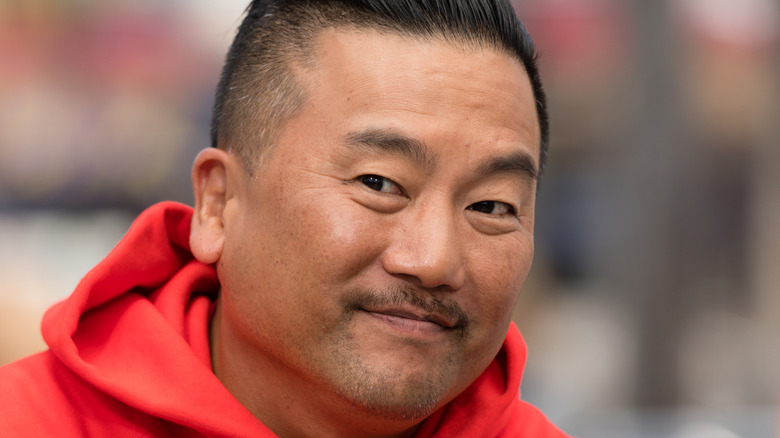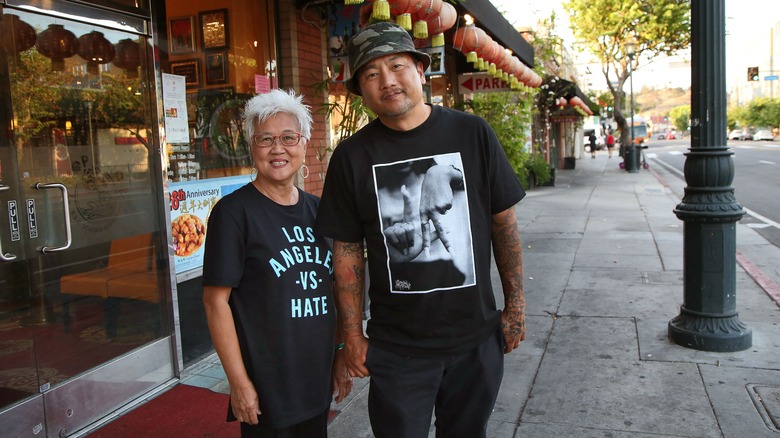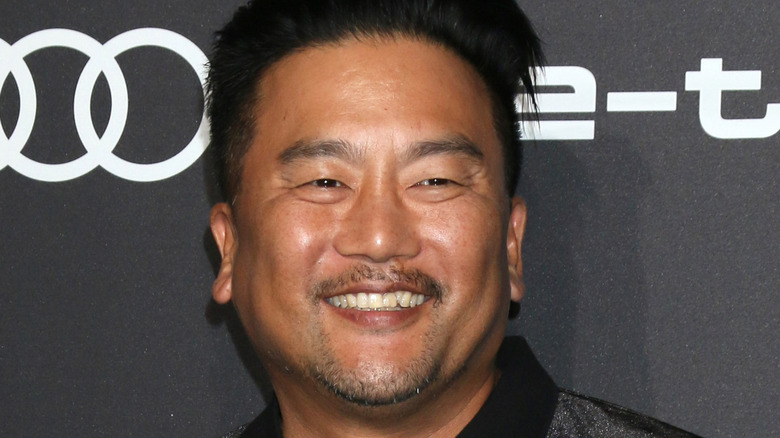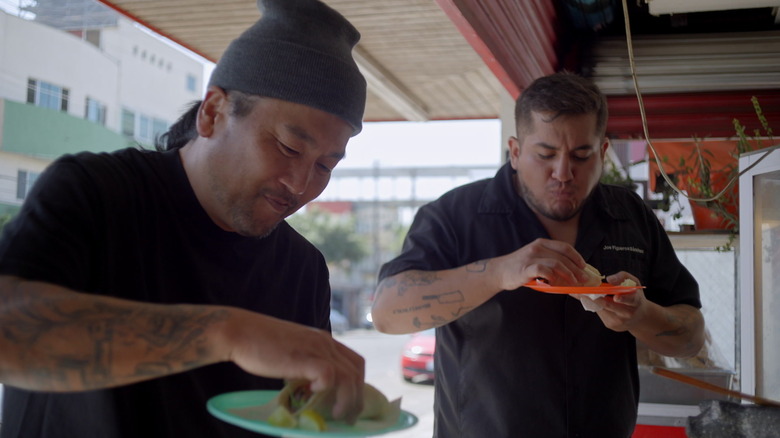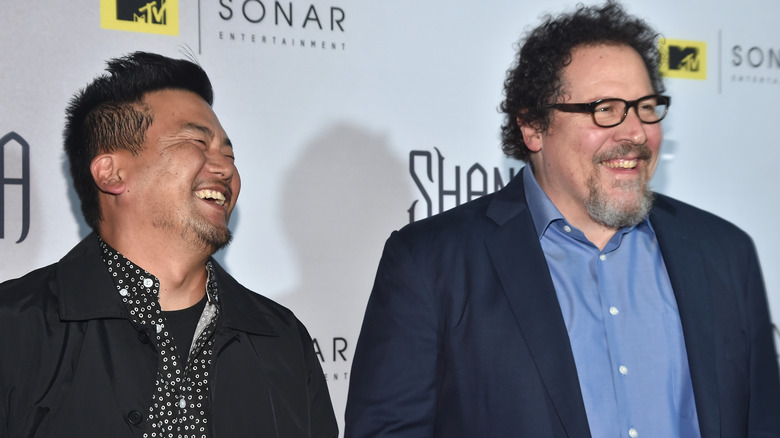Roy Choi Opens Up On Why He Ventured Into Social Justice TV With Broken Bread - Exclusive Interview
If you enjoy TV shows about food (and really, who doesn't?), you've probably noticed that food shows come in a few familiar varieties. You've got recipe shows like "Barefoot Contessa," cooking competitions like "Chopped," and documentaries about culinary celebrities like "Chef's Table." Blurring those lines a bit has been "The Chef Show" with Roy Choi and Jon Favreau (currently in production for Season 3), which combines documentary and recipe demonstration with unscripted (and often hilarious) celebrity banter (per Forbes).
So, in what category should we place Choi's newest venture, "Broken Bread," which begins airing its second season on PBS on January 31? None of the above. In an exclusive interview with Mashed, Choi explained that as the title implies, his new series breaks the mold of food-focused television content, because the KCET/Tastemade collaboration explores so much more than what people eat–and takes a deep dive into the social, political and economic factors that make our food chain "broken." If this sounds like a departure from Choi's playful kitchen adventures with Favreau, it is. So why the change in direction for Choi–and does the title of the show have anything to do with the epic drama, "Breaking Bad?" Fortunately, Choi was happy to answer these questions and more.
What's different about Broken Bread
How is "Broken Bread" different from other food focused shows?
The soundbite is, "It's different because we're not really a food show." We are a solution-based social justice show disguised as a food show. There's a little bit of an "I got you" moment with "Broken Bread," a little bit. We use food, not in a manipulative way or not in a bad way, but we use food as a bridge to get people to come in. Because it is TV at the end of the day, we want to be entertainment and we want to be storytellers and we don't want to veer too far off into politics or into divisiveness or be argumentative or antagonistic or get too philosophical on things. Food allows us to keep the through line, and any time we start to veer off too much, or things become a little too intense or too heated, we come back to the food — not only for ourselves, but also for the topic itself and for the purpose of the show, for it to be a little bit healing and a little bit nurturing, so that we can continue to find solutions. That's ultimately what "Broken Bread" is: to be a platform to find solutions for these really, really difficult and almost [incomprehensible] problems.
If I were to just say these problems that we cover on the show, they just seem so crazy: seeds are disappearing! The whole essence of agriculture and regenerative agriculture is disappearing. Kids in elementary schools can't even access any food that have any nutrients. Communities that have been forced and pushed through the history of American culture, especially communities of color, are continuously ... now being pushed again out of their home. There are no regulations or laws to protect them. They're literally being forced out. Immigrants' water is being cut off in order for them to flee from their homes, or their apartments, to make way for luxury condos.
If I were to just talk about these things, that's really hard to watch on a Tuesday night at 8:00 p.m., right? But if you throw a little food in there and you put some flavor in there and you talk about these things like a family table and you say, "We're here to help, we're here to listen, and here's someone that is doing something about it," that's really what "Broken Bread" is about. I guess that's what makes it different. This union between KCET public television and Tastemade, for me as a host, that union allows me to just tell the truth ... So really, once you're relieved of any of those pressures of life, and then the only thing that you can rely on is your own moral compass and the moral compass of the people that you're covering – then you can maybe talk about some real [stuff]! That's really what ... makes it different, I think.
The origins of the show's name
Why is the show called "Broken Bread"?
There's definitely all of those relative inflections and the alliteration of the word and the reference to "Breaking Bad," the reference to breaking bread. The show's name is catchy, but it's also that intersection of social justice disguised as a food show. When you hear the words "broken bread," it instantly takes you to the idea of breaking bread, which instantly, with the word itself and gathering together around the table, it takes you to the mindset of food and it takes you to the mindset of feeding and nurturing.
If you were to just take the title literally, it means "broken systems." We could call the show "Broken Systems," but then that hits a different nerve. It's hits a nerve in people that do believe and don't believe — that they are a part of the problem, that they are part of the solution. Then it creates divisiveness, it creates sides. We don't want this show to have sides. We want this show to just say, "Hey here, for example, here is what we're covering." This farmer is saying that seeds are disappearing, and if we don't start to do something about it, there may be no heirloom or wild or natural or dynamic seeds, it will be maybe five seeds that exist within the whole world controlled by one source. That could happen within the next five to ten years, and because of that, we will have all these diseases and things that will happen that will be controlled again by only one conglomerate. [Those are] broken systems. That's a hard sell to get people to tune in, because, again, it creates two sides of a fence, whereas "Broken Bread" is: Let's all gather around the table and let's eat and let's just talk about this stuff. "Where did this food come from?" This and that.
What filming Broken Bread has taught Roy Choi about himself
Did anything surprise you when you were producing these two seasons of "Broken Bread"?
Well, [in] this season, the most surprising thing ... I think there's two things that surprised me because I think the through line of both seasons [is], "It's still the same show." It's grown up a little bit, but it's still the same show. We've gone from junior high to high school, and we've gone from tween to teen. You know what I'm saying? I think going to Tijuana definitely surprised me. I didn't know ... I think I had the [unintentional] luxury of being very comfortable and knowing everyone that's in the first two seasons. Even if I didn't know them personally, I knew about them. I was very confident, I was very comfortable in certain situations, but Tijuana threw me in a situation where everything was new. I felt like a kid again, I felt completely ... I was just as a host, I was filled with so many questions and so much curiosity and my whole essence just opened up to everything happening around me. I was able to absorb what I was going through in Tijuana, and hopefully as a host, viscerally, transferred that to the viewer.
The other thing is, I think of myself as a "television person" in front of the camera, I think I grew between Season 1 and Season 2. I got out of my head a little bit and I became a little more comfortable with blocking and knowing where the camera is and being more of a television host, and finding that energy level that I could give to the screen. In Season 1, I think I did a good job, but I was still figuring myself out because I still had one foot in my everyday life and one foot in like, "Is this TV thing going to be a real thing for me or not?" But this, I completely gave myself to it and I think I found a new level within myself as a television host.
Roy Choi talks about the next season of The Chef Show
How is production of "The Chef Show" going?
Yeah, we have "The Chef Show." We still have about five episodes that Jon [Favreau] and I have to film, and I can't wait to get back in the kitchen with John. We miss each other. So I see him a lot, but we just miss hanging out and cooking together, but he's a little busy right now. So yeah, whenever he has a moment, Jon sometimes, he could get that inspiration within the next five minutes. So he could call me after this and say, "Let's get back in the kitchen." So I'm just always ready and waiting for him.
Is Jon Favreau making an appearance on "Broken Bread?"
On "Broken Bread", no. He's not on "Broken Bread," no.
Season 2 of "Broken Bread" premieres tonight at 8 p.m. PT on KCET and Tastemade.
